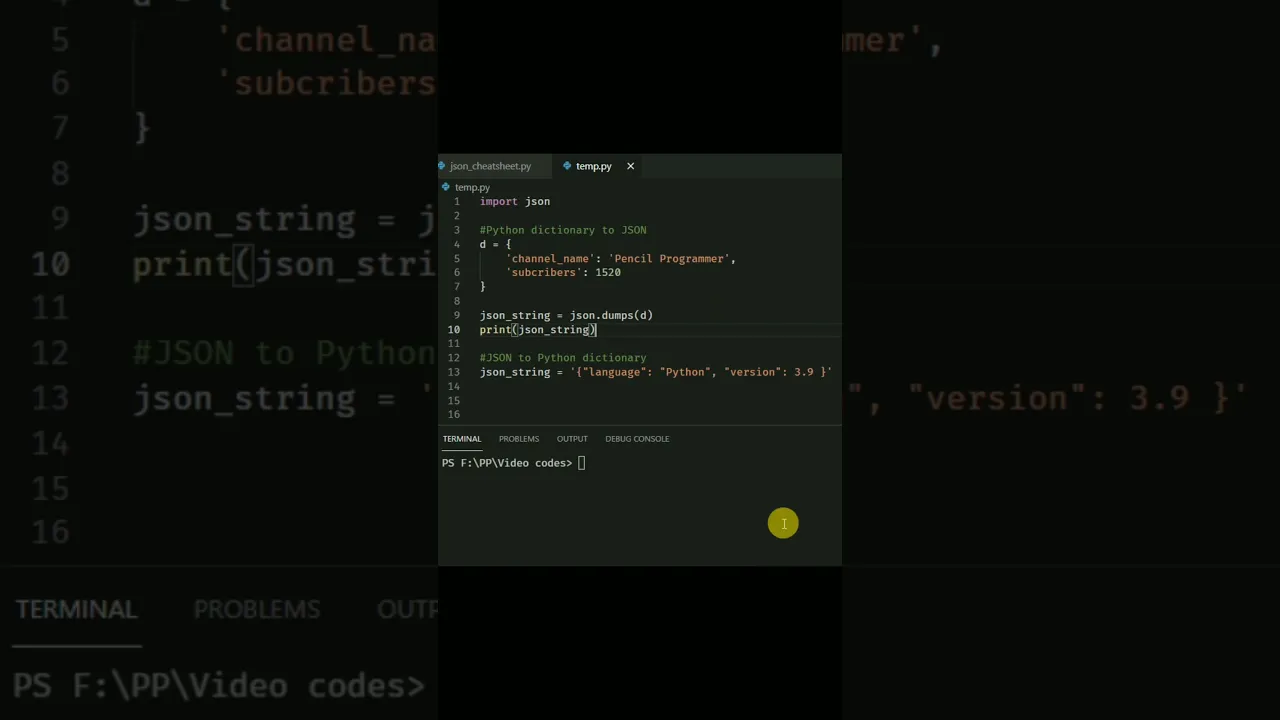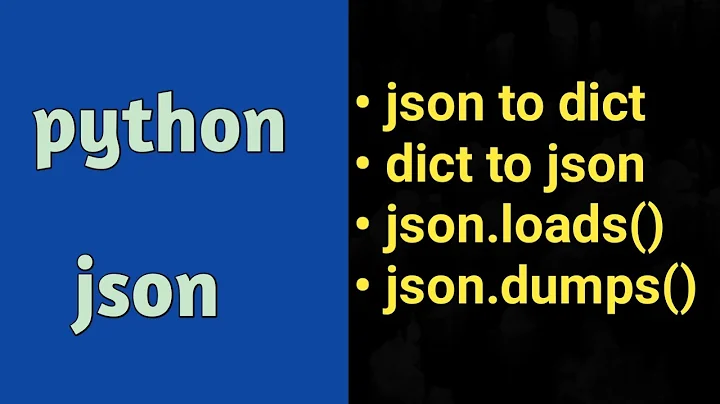What is the difference between json.dump() and json.dumps() in python?
Solution 1
There isn't much else to add other than what the docs say. If you want to dump the JSON into a file/socket or whatever, then you should go with dump(). If you only need it as a string (for printing, parsing or whatever) then use dumps() (dump string)
As mentioned by Antti Haapala in this answer, there are some minor differences on the ensure_ascii behaviour. This is mostly due to how the underlying write() function works, being that it operates on chunks rather than the whole string. Check his answer for more details on that.
json.dump()
Serialize obj as a JSON formatted stream to fp (a .write()-supporting file-like object
If ensure_ascii is False, some chunks written to fp may be unicode instances
json.dumps()
Serialize obj to a JSON formatted str
If ensure_ascii is False, the result may contain non-ASCII characters and the return value may be a unicode instance
Solution 2
The functions with an s take string parameters. The others take file
streams.
Solution 3
In memory usage and speed.
When you call jsonstr = json.dumps(mydata) it first creates a full copy of your data in memory and only then you file.write(jsonstr) it to disk. So this is a faster method but can be a problem if you have a big piece of data to save.
When you call json.dump(mydata, file) -- without 's', new memory is not used, as the data is dumped by chunks. But the whole process is about 2 times slower.
Source: I checked the source code of json.dump() and json.dumps() and also tested both the variants measuring the time with time.time() and watching the memory usage in htop.
Solution 4
One notable difference in Python 2 is that if you're using ensure_ascii=False, dump will properly write UTF-8 encoded data into the file (unless you used 8-bit strings with extended characters that are not UTF-8):
dumps on the other hand, with ensure_ascii=False can produce a str or unicode just depending on what types you used for strings:
Serialize obj to a JSON formatted str using this conversion table. If ensure_ascii is False, the result may contain non-ASCII characters and the return value may be a
unicodeinstance.
(emphasis mine). Note that it may still be a str instance as well.
Thus you cannot use its return value to save the structure into file without checking which
format was returned and possibly playing with unicode.encode.
This of course is not valid concern in Python 3 any more, since there is no more this 8-bit/Unicode confusion.
As for load vs loads, load considers the whole file to be one JSON document, so you cannot use it to read multiple newline limited JSON documents from a single file.
Related videos on Youtube
Kumaran
Updated on October 31, 2020Comments
-
 Kumaran over 2 years
Kumaran over 2 yearsI searched in this official document to find difference between the json.dump() and json.dumps() in python. It is clear that they are related with file write option.
But what is the detailed difference between them and in what situations one has more advantage than other? -
 João Gonçalves over 7 yearsAll text created in a python string object is unicode, but is it safe to assume that generically? i.e. when loading contents from a file?
João Gonçalves over 7 yearsAll text created in a python string object is unicode, but is it safe to assume that generically? i.e. when loading contents from a file? -
 Antti Haapala -- Слава Україні over 7 years@JoãoGonçalves it means you cannot mix binary data with text so that python approves it silently. e.g.
Antti Haapala -- Слава Україні over 7 years@JoãoGonçalves it means you cannot mix binary data with text so that python approves it silently. e.g.json.dumps([b'123'])->TypeError. -
 Antti Haapala -- Слава Україні over 7 years@JoãoGonçalves also do note that the strings in JSON documents must be Unicode, and must be in any of UTF-8, UTF-16 or UTF-32 according to RFC 7159
Antti Haapala -- Слава Україні over 7 years@JoãoGonçalves also do note that the strings in JSON documents must be Unicode, and must be in any of UTF-8, UTF-16 or UTF-32 according to RFC 7159 -
 João Gonçalves over 7 yearsThanks for that explanation! Makes sense
João Gonçalves over 7 yearsThanks for that explanation! Makes sense -
 Boy over 4 yearsCan you show an example on how to use dump() to send through socket? I know that I can use dumps() and than encode() to convert to bytes, but is there any shorter way?
Boy over 4 yearsCan you show an example on how to use dump() to send through socket? I know that I can use dumps() and than encode() to convert to bytes, but is there any shorter way? -
 oldboy about 2 yearsis
oldboy about 2 yearsisdump(orwith openanddump) asynchronous or will thedump(orwith openanddump) completely finish executing before moving onwards in the script? -
 oldboy about 2 yearsis
oldboy about 2 yearsisdump(orwith openanddump) asynchronous or will thedump(orwith openanddump) completely finish executing before moving onwards in the script? -
 Antti Haapala -- Слава Україні about 2 yearscompletely finish, except that dump might still perhaps have it in buffers...
Antti Haapala -- Слава Україні about 2 yearscompletely finish, except that dump might still perhaps have it in buffers...





